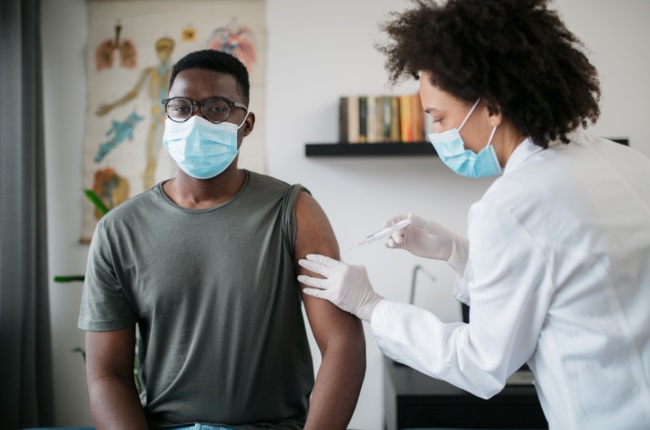
He’s begged, rebuked, gently chided and cajoled.
“My fellow South Africans…”
This is surely the most famous phrase in the country now. More than “Nkos’ sikelela”, more than “Awê ma se kind,” more than “It’s not inside – it’s on top!”
President Cyril Ramaphosa has called on South Africans to wear masks, to social distance and to get vaccinated in their numbers.
And after a promising start, the vaccination drive seemed to be gaining momentum. Then we started getting the messages from vaccination centres: not enough people are showing up to get the jab.
Read more| The power to defeat the coronavirus is in our hands
“We do not have a shortage of vaccines,” the City Press reported this weekend, quoting Health Minister Joe Phaahla, “but rather a shortage of arms.”
In fact, South Africa missed government’s target of a quarter-of-a-million per day jabs by a few hundred thousand arms, with about 180 000 vaccines administered per day in the past week and Friday sinking to a low of just 140 000 jabs, the newspaper reported.
Meanwhile the third wave is battering us from province to province, with KZN being the latest to officially declare a third wave as the rate of infections and deaths soar to alarming levels.
So why the hesitancy?
Well, a lot of it has to do with messaging as a one-size-fits-all approach simply does not work when it comes official communication about vaccines, BBC Future reports. In SA, it’s estimated that about 25% of us are unwilling to get jabbed and vaccine hesitancy in the UK is about the same – at 10-20% of the population being reluctant to get vaccinated, whereas it’s 50% in Japan and 60% in France, according to the BBC report.
While it hasn’t all been in vain, with the state’s target of 250 000 vaccinations per day reached on 21 July, we’ve dipped below 200 000 vaccinations per day since 29 July. Which seems to prove the argument made by psychologists who specialise in medical decision-making that there are, as the BBC reports, “many complicating factors that need to be addressed sensitively if we are to have any hope of reaching population-level immunity”.
These are five common myths over-riding rational decision-making on vaccines.
"Many many complicating factors that need to be addressed sensitively if we are to have any hope of reaching population-level immunity." These are the five common myths over-riding rational decision-making on vaccines.
1. It’s a micro-chip being inserted in my body to track me.
Besides the fact that we live in an age of digital surveillance, the idea of a jab being a micro-chip used by the government to track people is absurd. While Apiject Systems of America, the makers of medical-grade injection devices for vaccines and micro-chips, refuted claims that their products were being made to track individuals, the viral social media video making these claims has continued to make people suspicious.
“The company has an optional version of its product that contains a microchip within the syringe label that helps providers confirm a vaccine dose’s origin,” Health24 reported, quoting a Reuters interview with Apiject spokesman Steve Hofman, confirming that particular microchip was optional and “cannot gather any personal information”.
Read more| The real reasons why breast is best
2. It is unsafe for pregnant women.
On the contrary, “symptomatic pregnant individuals who contract Covid-19 are at more risk of severe illness, complications and death than non-pregnant women,” according to Johns Hopkins Medical Centre.
The centre’s director of gynaecology and obstetrics, Dr Andrew Satin, and director of maternal-foetal medicine, Dr Jeanne Sheffield, agree that “while there are many unanswered questions about the vaccines for pregnant women”, where a pregnant woman has consulted with a physician prior, “Covid-19 vaccines currently authorised by the Food and Drug Administration (FDA) should not be withheld from pregnant individuals who choose to receive [it]”.
3. The vaccine can make humans magnetic.
This is probably one of the most bizarre myths.
But there’s a valid reason why many are buying into it. Rumours about 5G radiation pretty much started spreading as soon as vaccine development plans were announced. It’s human nature: we simply don’t trust what we do not understand.
The World Health Organization (WHO) did clarify, though, that viruses cannot travel on radio waves or mobile networks. “It is also a fact that Covid-19 is spreading in many countries that do not have 5G mobile networks,” private healthcare NetCare said. “Covid-19 is spread through respiratory droplets when an infected person coughs, sneezes or speaks. People can also be infected by touching a contaminated surface and then their eyes, mouth or nose.”
As for the myth about the jab making humans magnetic? Since All Covid-19 vaccines are free from metals, according to the CDC, it follows that they “do not contain ingredients that can produce an electromagnetic field at the site of your injection”.
4. It will change my DNA.
While both the mRNA vaccine by Pfizer-BioNTech and the viral vector vaccine help a person’s cell build immunity against Covid-19, “the material never enters the nucleus of the cell, which is where our DNA is kept”, according to public health agency Centre for Disease Control and Prevention (CDC).
5. People die or get gravely sick after getting the jab.
While some people did report experiencing short-lived symptoms such as tiredness, a sore arm, headache or nausea after getting the vaccine, the jab cannot make you ill. Any reactogenicity – or immediate side effects from the vaccine are short-term – and merely indicate the jab is doing its job. “We definitely do expect some sort of reactogenicity,” Professor Linda-Gail Bekker, co-lead investigator of South Africa's Sisonke Covid-19 vaccine trial, told Health24.
“That means the immune system is being a little bit shaken up by the vaccine and typically, what people get is mild flu-like symptoms – perhaps even a little bit of a fever.”



















